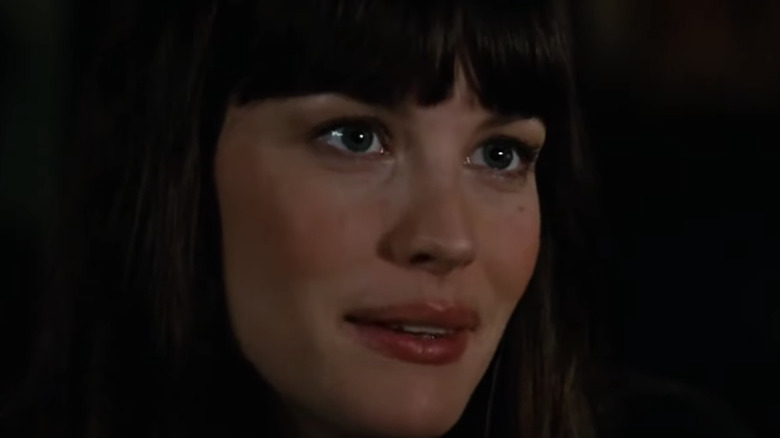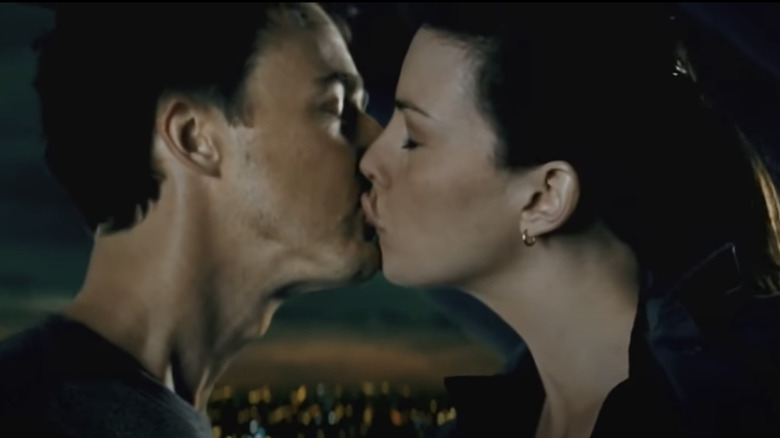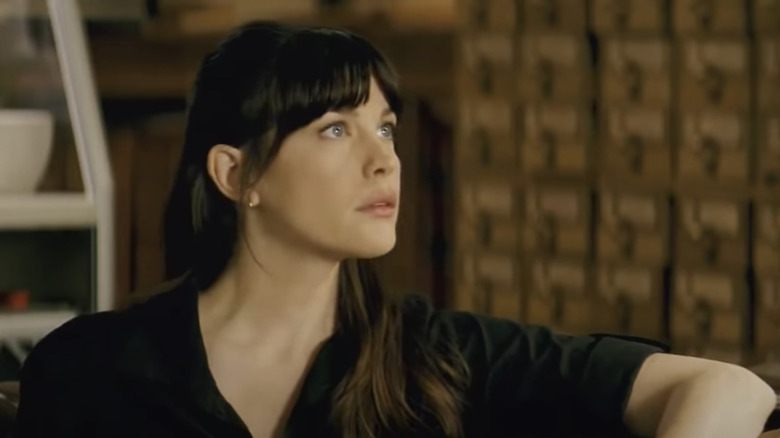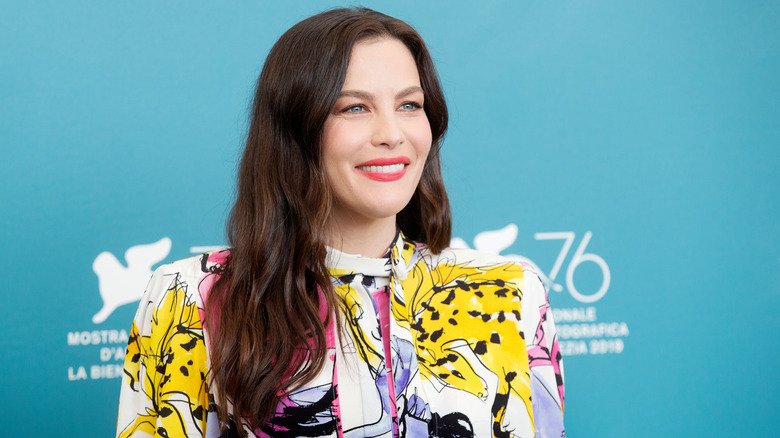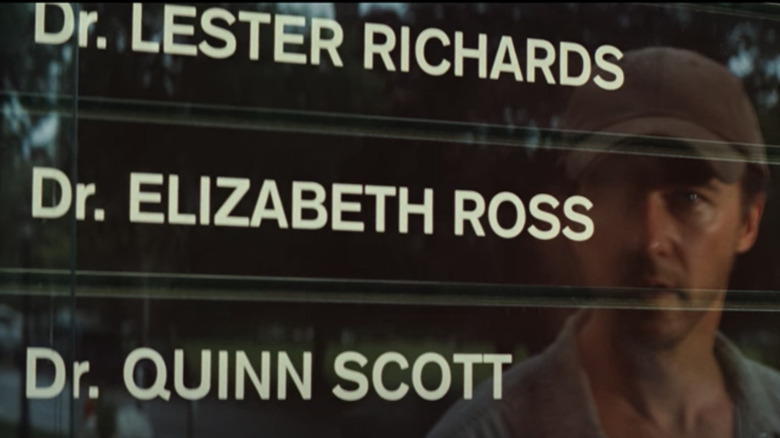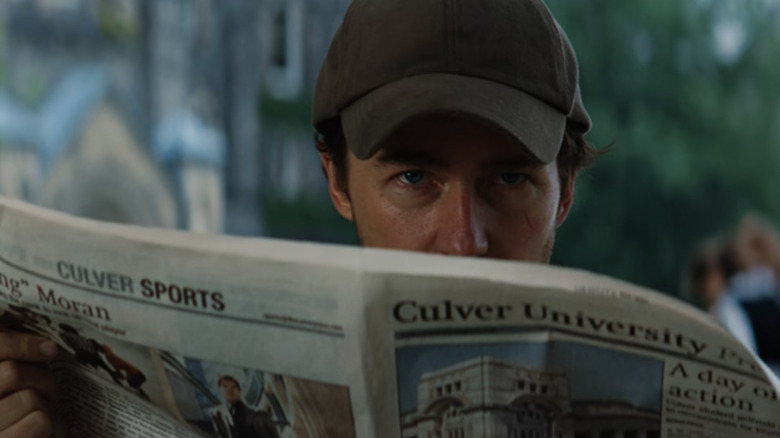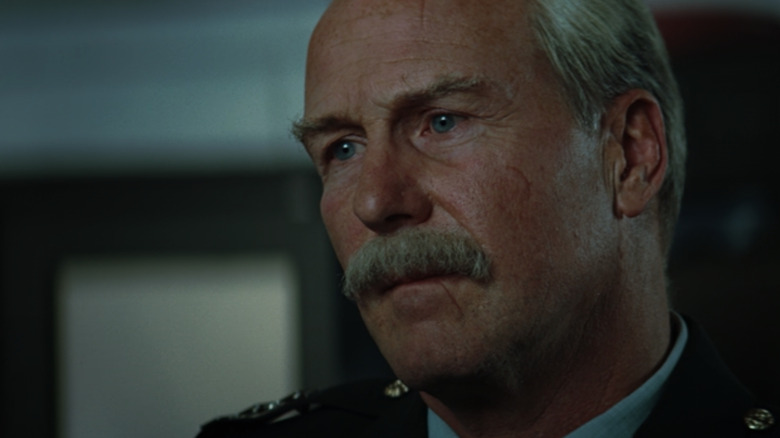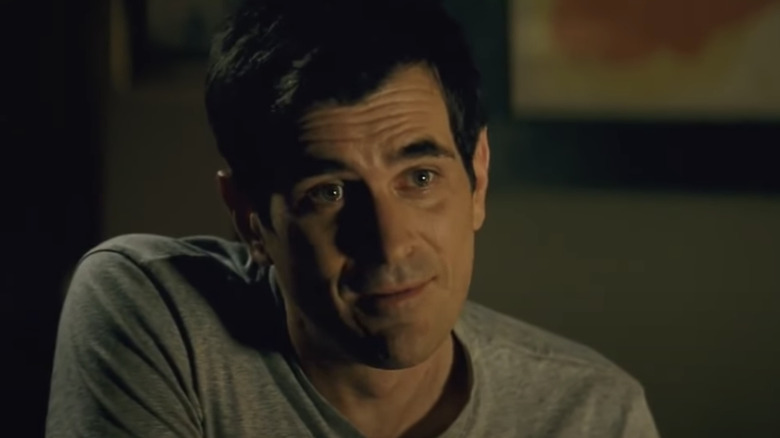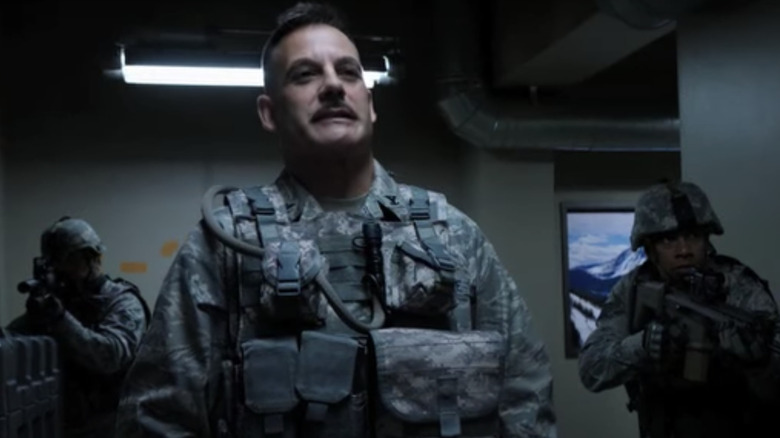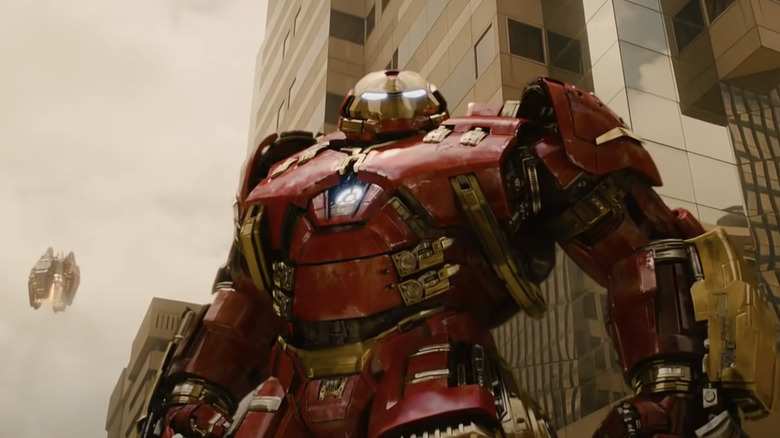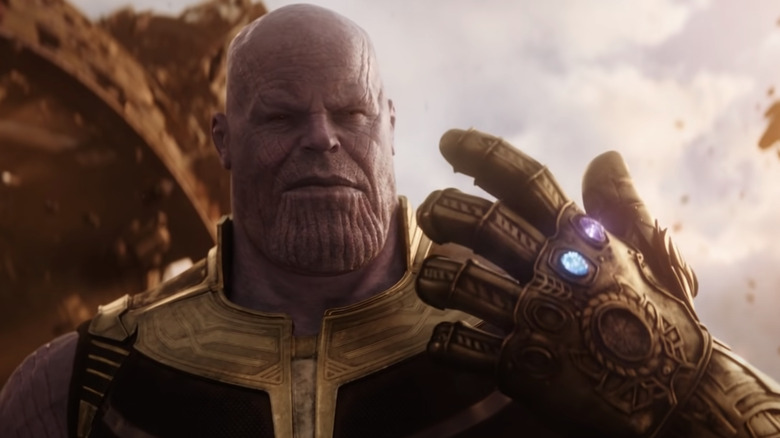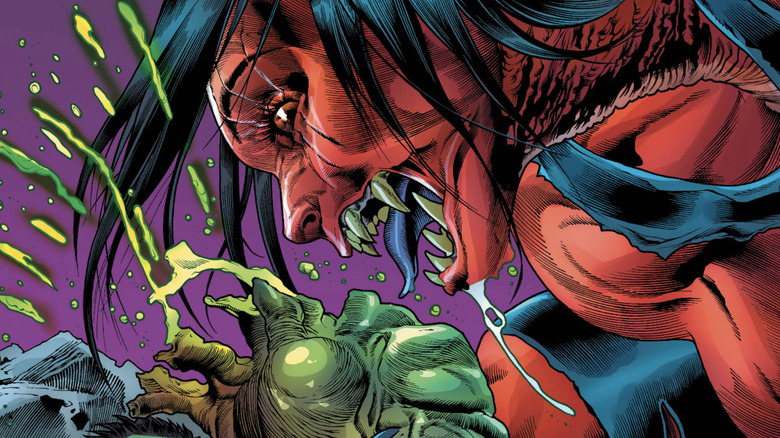The Untold Truth Of Marvel's Betty Ross
It's not easy being the second milestone in a cultural revolution. Everyone remembers "Iron Man," the 2008 movie that kick-started the Marvel Cinematic Universe. Somewhat less well-remembered, however, is the film that came next, also from Marvel Studios, also in 2008.
"The Incredible Hulk" is an anomaly — widely viewed as one of the worst MCU films, it's the only one whose lead protagonist was re-cast, the only one with no sequel in sight, the only one not available to stream on Disney+. The seeds it planted for future films went nowhere; its post-credits scene was retconned via a short film included as a special feature on the "Thor" DVD. It's the MCU movie that wasn't.
That could be changing, however. With a "She-Hulk" series coming in 2022 and Tim Roth already signed on to reprise his role as the Abomination (along with his cameo in "Shang-Chi and the Legend of the Ten Rings"), there's been a renewed interest in Marvel's abandoned second effort. Specifically, rumors have been swirling that "She-Hulk" could bring back Betty Ross. Not only is Betty an interesting character in her own right, but she also has connections to corners of Marvel Comics that have thus far only been hinted at. With that in mind, there's no better time to examine what we already know (or think we know) about Marvel's Betty Ross.
Numerous MCU spoilers lie ahead, so if you're not caught up and you choose to read on anyway, you're not allowed to get angry and smash things!
She was the Hulk's primary love interest
Ask an MCU fan who Bruce Banner's primary love interest is and they'll probably answer quickly: Black Widow. If they care deeply about the question, they might mention Valkyrie, who seemed to have something going on with Bruce in "Thor: Ragnarok." If they're thinking about the future instead of the past, they're likely to suggest that with Widow dead and Valkyrie apparently less interested in the "Professor Hulk" version of Bruce, he doesn't really have a love interest anymore, and they'd probably be right.
However, ask a Marvel Comics fan who Bruce Banner's primary love interest is, and they will, without hesitation, say Betty Ross. Betty predates both Widow and Valkyrie in Marvel history, having debuted in "Incredible Hulk #1" in 1962. She has essentially played the role of the woman in Banner's life from the start, even marrying him in "Incredible Hulk #319" in 1986. It didn't last, of course, because that's not how comics work, but Betty was never gone for long, and she's currently playing a major role in Al Ewing's "Immortal Hulk" series.
Ross has also been a part of nearly every Hulk adaptation going back to 1966 and has been played by at least nine actresses, including Jennifer Connelly in Ang Lee's 2003 Eric Bana-starring live-action film "Hulk." After that film's disappointing box-office, it's no surprise that the role was re-cast as Liv Tyler for "The Incredible Hulk" — the only surprising thing, perhaps, is that although we've seen plenty of Hulk, we haven't heard from Betty since 2008.
She's only appeared in one MCU film
If "The Incredible Hulk" is an anomaly in the history of the MCU, Betty is an anomaly of her own — one of the only major Marvel characters who has appeared in just one MCU film, despite the fact that she lived to the end.
There have been a variety of outside factors working against her — the biggest one, of course, being that the Hulk's intellectual property rights are a complicated mess involving Universal Pictures, who have been less willing than, say, Sony, to work with Marvel over the years. There have been rumors that Marvel has recently secured the rights to the Hulk again, and the arrival of the "She-Hulk" show seems to lend those rumors some credence, but we won't know for sure until Marvel actually produces another standalone Hulk movie. For now, Betty is stuck in limbo alongside several other Hulk-adjacent characters until some kind of clarity presents itself.
Still, even considering the rights dispute, it's weird that Betty's name hasn't even been mentioned outside of "The Incredible Hulk." The MCU is filled with women who serve as love interests within the individual Marvel film franchises but don't get to play in the larger sandbox, yet none of them have been erased so thoroughly as Betty has.
You'd think that Bruce would at least say something about her to Black Widow when they discuss their potential romantic future in "Age of Ultron," wouldn't you? Or that "Thunderbolt" Ross would make even a passing reference to his daughter when he's appearing in movies like "Black Widow"?
She's played by Liv Tyler
One of the most interesting things about Betty Ross outside the fictional world of the MCU is that she represents something of a turning point in the career of actress Liv Tyler. Known primarily for her performances in blockbusters like "Armageddon" and the "Lord of the Rings" films, Tyler doesn't have a massive filmography, but there was a solid 12 years or so, from the mid-1990s to the mid-2000s, in which she was a frequently-seen leading woman.
"The Incredible Hulk" wasn't Tyler's final movie in a starring role by any stretch, but it was her last major studio production for over a decade — she worked almost exclusively in independent films and television after 2008, including the underrated James Gunn superhero comedy "Super," "Robot & Frank," and some powerful work in the HBO series "The Leftovers." She wouldn't return to the studio system until 2019, when she landed a role in the Brad Pitt science fiction vehicle "Ad Astra."
It should be noted that Tyler's performance as Betty Ross is a long way from phenomenal — though her fellow lead, the notoriously difficult and loudly re-cast Edward Norton, tends to take more of the blame for the film's failure. That's no reason to not ask Tyler to reprise the role, however — if given a better script and more to do, she could potentially breathe a whole new life into the character of Betty Ross, and if she were to make a surprise appearance in "She-Hulk," she's recognizable enough that her arrival would get an instant reaction.
She's the only reason Hulk is alive
The failure of any character to mention Betty's name in the post-2008 MCU is particularly egregious considering the role she plays not only in Bruce Banner's story, but in his continued existence. Unlike the comic version, in the MCU, Betty is a scientist in her own right, an expert in radiation and cellular biology, and Bruce's partner in the academic as well as romantic sense. It's her work that allows Bruce to survive his transformation into the Hulk — during the original experiment that changed him, Betty developed a myostatic primer that gave his cells the ability to absorb gamma radiation without killing him. Without Betty, Bruce's story ends in that lab (though at least she saves herself both some hospitalizations and aggravation).
It's beyond weird to look at the MCU as a continuous narrative and wonder why Betty disappeared. She's not just the reason Bruce is still alive — she was his co-scientist in the experiment. She's an expert in gamma radiation. You're telling us Nick Fury didn't even think about calling her in when Loki stole the Tesseract in "The Avengers," thereby securing someone who could locate its gamma signature and also didn't need to have a special deathtrap built for her just in case she got upset and started destroying stuff? To paraphrase Thor, we would have at least sent an electronic letter, it's called an email? Come on, Marvel. Put some respect on Doctor Elizabeth Ross' name.
She works at Culver University
Here's another reason Nick Fury should have known how and why to contact Betty in "The Avengers": She's a professor at a university that Fury had presumably been keeping his eye on for years. Significant portions of the action in "The Incredible Hulk" take place on the campus of Virginia's Culver University (named for Kenneth Culver Johnson, the creator of the 1978 "Incredible Hulk" TV series), Bruce's former place of employment and where Betty currently works.
They're not the only two MCU characters with Culver credentials. Jane Foster, former lover of Thor and future actual Thor, studied astrophysics there — it's where she met her friend and mentor, Erik Selvig. Yes, you read that right: Fury didn't bring in Betty to work with the Tesseract, despite the fact that the last guy he brought in to work with the Tesseract was her direct professional colleague.
Foster and Selvig are by no means the only Marvel characters associated with Culver. It's where Darcy Lewis signed up for the fateful internship that would ultimately change her major from political science to astrophysics. It was also the workplace of Dr. Andrew Garner, a neurologist, psychologist, and former S.H.I.E.L.D agent with close ties to Fury's right-hand man, Phil Coulson, and Dr. Marcus Benson, who S.H.I.E.L.D. would later recruit. Even Janet and Victor Stein from the "Runaways" series are Culver graduates. Considering the pedigree of the staff and alumni, they might as well rename it Marvel University.
Her dad is Thaddeus "Thunderbolt" Ross
Okay, you're still not convinced that Betty should have made it into "The Avengers?" Fury was secretly importing the Hulk from Calcutta not as a scientist, but as a member of his burgeoning superhero team, you say? Fine, we get that. How about the fact that Betty never appears in a Marvel movie again despite the fact that her dad, played by William Hurt, has gone on to appear in four of them?
Thaddeus "Thunderbolt" Ross is pretty much the only side character from "The Incredible Hulk" with a continued MCU career thus far. After blundering spectacularly in his efforts to capture the Hulk as a Lieutenant General in the army, Ross managed to fail up, appearing in "Captain America: Civil War" as the U.S. Secretary of State. It's Ross who presents the Avengers with the Sokovia Accords and leads the effort to hunt down those who refuse to sign — though of course he fails in that effort as well, most notably at the beginning of "Black Widow." He also appears briefly in "Avengers: Infinity War" and "Avengers: Endgame."
Thaddeus Ross certainly hasn't received a plethora of screentime following his role in "The Incredible Hulk," but he gets enough that you'd think his daughter's name would come up once in a while. Ross and Banner appear in the same room within seconds of each other during "Infinity War," but their history isn't mentioned. Marvel can clearly use "Incredible Hulk" characters if they want to, but apparently not Betty.
Her ex-boyfriend is another gamma-based superhero (in the comics)
Betty has connections to several other notable Hulk side characters who, like her, appear in "The Incredible Hulk" and then are never used again. One of these is the man she's dating when Bruce returns to the United States, a psychologist (who works at Culver University) named Leonard Samson. He seems like a nice guy, and he does allow Bruce to stay at his house for a while, but his primary role in the movie is to betray Bruce to Thaddeus Ross, calling to inform Ross of Bruce's whereabouts. After that, he doesn't appear in the MCU again — Ty Burrell, the actor who plays Samson, had pretty much all his major scenes cut from the film, including the one where he confesses to Betty over the phone and realizes he's lost her. Burrell then found himself a hit sitcom and became very, very busy for the next 11 years.
In the comics, Samson is indeed a psychiatrist, and he does briefly attempt to romance Betty, but that's where the similarities end. Doc Samson, as he's known, is himself a gamma-irradiated superhuman who has spent most of his comics career trying to track down the Hulk so he can cure him. He's a fascinating character defined by his genius, his obsessions, and his moral ambiguity, and if Marvel really is planning more Hulk-related material, we'd expect Samson to show up at some point — hopefully this time with his signature long green hair, which is the entire reason he's called "Samson" in the first place, and would look very interesting on Ty Burrell.
Her other comic book husband is in Agents of S.H.I.E.L.D.
Glenn Talbot doesn't appear in "The Incredible Hulk," though it would have made sense to include him. Josh Lucas played the character in the 2003 Ang Lee movie, in which he's a secondary villain trying to harvest samples of Hulk's body for military science. He's also firmly associated with the Hulk in the comics — as a subordinate to Betty's father, General Ross, he was deeply involved in Ross' hunt for the Hulk, as well as Ross' preference for Betty's future husband, as opposed to Bruce Banner.
In the comics, after Betty's first attempt at marrying Bruce is sabotaged by Hulk nemesis the Leader, Betty gives up on the relationship and does, in fact, end up marrying Talbot. The marriage doesn't last, however; after taking over leadership of Gamma Base from Ross, Talbot is killed in combat with the Hulk. He hasn't been seen in comics since 1981, but he is quite definitively a Hulk character.
Which is why it's weird that he has nothing to do with the Hulk in the MCU, instead arriving in the ABC show "Marvel's Agents of S.H.I.E.L.D." As portrayed by "Heroes" alumnus Adrian Pasdar, he was a recurring character on the show for its first five seasons, ultimately becoming a version of the comic villain Graviton and getting killed by Quake for his trouble. He also very clearly had a wife who was not Betty Ross, so that's disappointing — but Betty is probably better off.
She inspired a Tony Stark invention
In 2015's "Avengers: Age of Ultron," the Hulk goes on a rampage due to the supernatural abilities of a new threat/comrade named Wanda Maximoff. Tony Stark, naturally, has a plan for just such an occasion — one that Bruce Banner helped him develop. Fittingly, its name is Veronica.
There are two elements to Veronica: A high-tech cage to try and contain Hulk after he's gone berserk, and (when that inevitably fails) a mobile service module designed to quickly transfer Stark into the Mark XLIV Iron Man armor, known to comic book fans as "The Hulkbuster," which ultimately does manage to take Hulk down. When asked in 2017, "Age of Ultron" writer/director Joss Whedon was upfront about the Archie Comics reference. "I just decided to call it Veronica because he used to be in love with a girl named Betty," Whedon said, "and Veronica is the opposite of that." It's nice to see that somebody acknowledges that the relationship between Bruce and Betty was a thing that existed.
She got Snapped by Thanos
While we know almost nothing about what Betty has been up to since 2008, we do know one thing about her: she got Snapped. After Thanos used the Infinity Gauntlet to murder half the universe at the end of "Avengers: Infinity War," directors Joe and Anthony Russo revealed in an interview with Huffington Post that Betty was among the characters who dissolved into dust. It's an ignominious ending to her story, but at least the Russos thought about her long enough to kill her offscreen.
It does raise a point of irony, however — Bruce Banner, having successfully combined his scientist intellect with the physical might of the Hulk, is the one who puts on the Infinity Gauntlet and executes a Snap of his own, causing the phenomenon known as the Blip and bringing Thanos' victims back to life. In a way, you can read this as Bruce saving Betty from the bad guy, just like he used to in the old days.
But there's another way of looking at it. When arguing that he should be the one to wear the Gauntlet, Banner argues that he's the only one who would survive. "The radiation's mostly gamma," he says. "It's like I was made for this." So thanks again, Betty, for being the one who originally figured out how to make Banner's cells absorb gamma radiation. If not for Betty, Thanos wins and all those people stay dead. So, as it turns out, Betty Ross is the true hero of the Infinity Saga.
She's a potential superhero
Like most Marvel characters, Betty's comic book history is a tangled web of death, resurrection, and retcons. However, if Marvel Studios decides to bring her back, they'll have no shortage of ideas for her character to draw from. While she began her career as Bruce Banner's love interest, Betty Ross has since become much more than that, particularly in the years after "The Incredible Hulk" was released — a gamma-themed superhero, and occasional villain, in her own right.
Betty's first fling with superpowers dates back to 1973, when the villain M.O.D.O.K. transformed her into a flying green monster called the Harpy. The process destroyed Betty's sanity and led her to attack the Hulk, but Bruce was able to restore both her mind and her human form.
It took almost 40 years for Betty to gain powers again — shortly after her father became the Red Hulk in 2008, he helped turn Betty into the Red She-Hulk, who had a brief superhero career before losing her powers again in 2014. In the "Immortal Hulk" series, however, Betty underwent her third transformation, this time into an amalgam of the previous two: the Red Harpy.
In Al Ewing's hands, she has become one of the book's best characters, and at this point there really is no excuse to keep her on the sidelines of the MCU. Just don't expect a screen version of Betty to rip out and eat the Hulk's heart — that's probably not happening.
